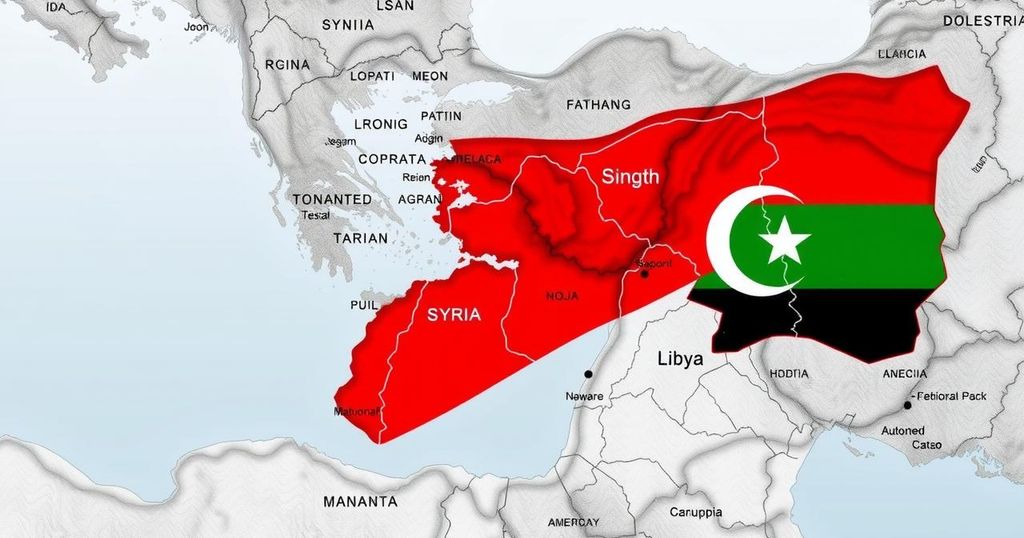The Regional Implications of Bashar al-Assad’s Ouster on Libya
The removal of Bashar al-Assad has prompted significant geopolitical shifts, particularly enhancing Russian interests in Libya and strengthening Khalifa Haftar’s position. Following Assad’s ouster, several of his officials have fled to Libya, indicating a direct interplay between the two nations. Russian military resources are being relocated to Libya, heightening concerns over increased conflict potential amid illicit activities surrounding Haftar’s regime.
The recent abrupt ouster of Bashar al-Assad from power in Syria has elicited notable repercussions extending across the Mediterranean, particularly influencing the geopolitical landscape in Libya. As Russia reallocates its military assets from Syria to Libya, there are growing concerns regarding the strengthening of Khalifa Haftar, a significant Libyan figure, amidst this transition. Reports indicate that following Assad’s downfall, numerous officials from his regime sought refuge in Benghazi, further intertwining Libyan and Syrian political dynamics.
The implications of Assad’s exit can be traced to an increase in aerial traffic between Syria and Libya, as Russia relocates military resources, including naval assets, to the strategic Libyan coastline. Observations suggest that this shift aims to fortify Haftar’s position, enhancing his leverage in negotiations and power struggles within the region. Over the years, Haftar has adeptly navigated alliances, transforming his connections from a US-backed figure to a crucial Russian ally, thereby solidifying his authority in eastern Libya.
Moscow’s strategic interest in Libya is augmented by the nation’s critical geographical location and the potential for secure naval access. Russia’s establishment of a naval base in Tartus has made Libya’s eastern coastal areas of particular significance, feeding concerns regarding expanding Russian influence in Africa. Analysts speculate that the dynamics will continue to evolve as Russia seeks to stabilize its interests and potentially extend its military footprint in the region.
Additionally, there are disturbing associations between Haftar’s regime and illicit trafficking networks, particularly involving human and drug smuggling, which further complicates interactions in the Mediterranean. Despite evidence of these activities and Western awareness of Haftar’s ties to Russia, there remains a disconnect in action taken against his consolidation of power.
The ongoing situation emphasizes a complex interplay of regional alliances, security concerns, and the shifting balance of power within North Africa. The interdependencies between Russia, Libya, and Syria are indicative of strategic maneuvers aimed at territorial and political reinforcement. Moreover, Western powers’ hesitance to confront these developments may embolden stronger factions within Libya and exacerbate conflicts in neighboring regions, such as Sudan and Mali, where arms might flow from Libya’s growing military stockpiles.
The article discusses the geopolitical ramifications of the recent removal of Bashar al-Assad from the Syrian presidency, particularly how this event has catalyzed a shift in power dynamics in Libya. Russia, a key player in both Syria and Libya, is reallocating military resources from Syria to Libya in response to the upheaval, raising concerns over increased Russian influence in North Africa. In parallel, Khalifa Haftar, a prominent Libyan military leader, appears to be leveraging this transition to strengthen his control over eastern Libya. The article analyzes these developments within a broader framework of interlinked political and military interests in the Mediterranean region.
In summary, the fall of Bashar al-Assad marks a significant turning point that reshapes the security landscape in Libya, with increased Russian involvement potentially empowering Khalifa Haftar. The intricate relationships and illicit dealings surrounding Haftar underscore the complexities of the situation, as Western concerns remain largely unaddressed. The implications of these dynamics may lead to escalations not only in Libya but also in other conflict-ridden regions of Africa, suggesting a need for more proactive engagement from Western powers to stabilize the area.
Original Source: www.france24.com




Post Comment